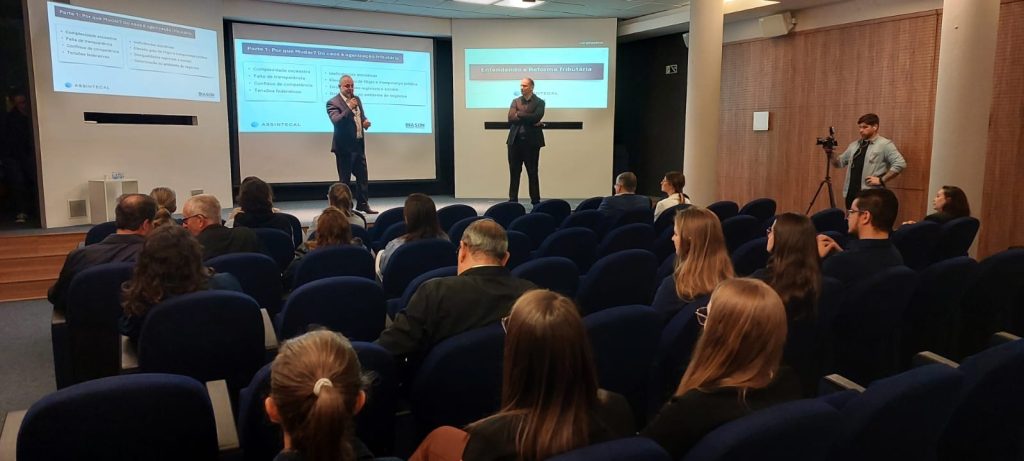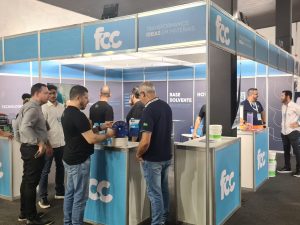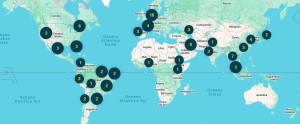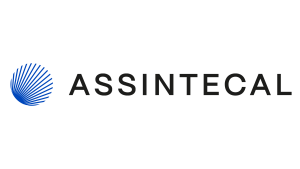Assintecal Clarifies Questions on Tax Reform
The Brazilian Association of Companies of Components for Leather, Footwear, and Artifacts (Assintecal) held a in-person meeting on the morning of September 3rd to discuss the Tax Reform.

The Brazilian Association of Companies of Components for Leather, Footwear, and Artifacts (Assintecal) held a in-person meeting on the morning of September 3rd to discuss the Tax Reform. With the goal of guiding the entity’s member companies, the event was presented by Valmor Biason and Fábio Mahl, director and coordinator of Accounting/Tax Advisory at Biason Assessoria Empresarial, respectively. The meeting took place at the ACI headquarters in Novo Hamburgo/RS.
According to Assintecal’s superintendent, Silvana Dilly, the purpose was to provide important information in a clear way about the main points of the topic and their impacts on the day-to-day operations of businesses. The Tax Reform will go through a transition phase starting in 2026, when a “testing phase” for adapting to the new tax system begins.
Highlighting that the reform will bring greater legal certainty and reduce bureaucracy in the “tax chaos” by replacing the current five taxes (PIS/Cofins, ICMS, ISS, and IPI) with the Dual VAT (CBS, federally administered; and IBS, state-administered), Biason detailed the expected schedule for adapting to the changes. According to him, starting next year, the collection of CBS (0.9%) and IBS (0.1%) will begin in amounts that can be deducted from the PIS/Cofins due. Then, in 2027, PIS/Cofins will be extinguished and CBS will enter with a full rate, with IPI being zero for all companies, except for those that manufacture products that compete with those developed in the Manaus Free Trade Zone.
Between 2029 and 2033, state and municipal taxes will be reduced with a gradual and proportional increase of the IBS. From 2033 onwards, the Tax Reform will be fully in effect in Brazil.
Another positive point of the Tax Reform, according to the speakers, is that taxes will be due at the destination of the goods, inhibiting the “fiscal war” between Brazilian states.
Transparency
According to Biason, while the reform may not significantly decrease the current tax burden, it will bring greater transparency to the system, as the CBS and IBS will no longer be embedded in the price of products. It will also reduce tax evasion, as a mechanism called Split Payment is planned, which will automatically calculate and transfer the owed amounts to federal and state revenues.
Tax Burden
The total tax burden with the reform, according to calculations by the Ministry of Finance itself, will be around 26.5% to 27.5%, assuming a CBS of 8.5% applied by the Federal Revenue. States will continue to have autonomy to create their own rates (IBS), but since the amount will be charged at the destination, it will ultimately be a “more harmonious system,” according to Biason.
Exemptions
The Tax Reform will also make staple food products exempt and provides for a cash back mechanism for lower-income families registered in the Federal Government’s CADÚNICO program.
What About Current Credits?
Regarding current credits accumulated by companies, Biason informs that PIS/Cofins credits can be offset against CBS payments. ICMS credits, however, can be offset against IBS payments, but over a period of 20 years (240 installments).
At the end of the event, the specialists performed simulations for the companies, demonstrating with a hypothetical example that production costs will remain the same and sales prices will be slightly lower with the new Tax Reform, improving competitiveness.
The meeting held by Assintecal was exclusive to members, who will receive the full recording of the presentation and will be able to ask specific questions to the specialists. To become a member of the entity, a company must contact them via email at relacionamento1@assintecal.org.br or by phone at (51) 3584-5200.
Read also









